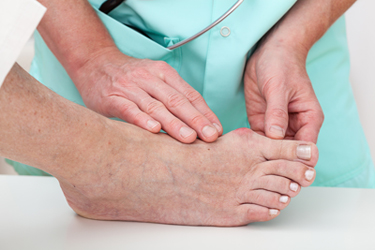NJ (908) 688-5577
NY (212) 737-2528
 A bunion is a bony bump located on the outside of the big toe. The bump may be swollen, red, and irritated due to friction as it rubs against your shoes. Bunions deform the feet, making the first metatarsal foot bone stick out and causing the big toe to point towards the other toes. Thick, hardened skin or calluses often form on the second toe and underneath the big toe. A bunion can also make it difficult to find comfortable shoes, as they change the structure of the feet. They can also cause pain and discomfort while walking or standing. Bunions tend to get worse without treatment, so if you have bunions, it is suggested that you seek the care of a podiatrist to stop or slow their progression and get the right treatment for you.
A bunion is a bony bump located on the outside of the big toe. The bump may be swollen, red, and irritated due to friction as it rubs against your shoes. Bunions deform the feet, making the first metatarsal foot bone stick out and causing the big toe to point towards the other toes. Thick, hardened skin or calluses often form on the second toe and underneath the big toe. A bunion can also make it difficult to find comfortable shoes, as they change the structure of the feet. They can also cause pain and discomfort while walking or standing. Bunions tend to get worse without treatment, so if you have bunions, it is suggested that you seek the care of a podiatrist to stop or slow their progression and get the right treatment for you.
If you are suffering from bunion pain, contact Glenn Davison, DPM of Advanced Podiatry. Our doctor can provide the care you need to keep you pain-free and on your feet.
What Is a Bunion?
Bunions are painful bony bumps that usually develop on the inside of the foot at the joint of the big toe. As the deformity increases over time, it may become painful to walk and wear shoes. Women are more likely to exacerbate existing bunions since they often wear tight, narrow shoes that shift their toes together. Bunion pain can be relieved by wearing wider shoes with enough room for the toes.
Causes
Symptoms
In order to diagnose your bunion, your podiatrist may ask about your medical history, symptoms, and general health. Your doctor might also order an x-ray to take a closer look at your feet. Nonsurgical treatment options include orthotics, padding, icing, changes in footwear, and medication. If nonsurgical treatments don’t alleviate your bunion pain, surgery may be necessary.
If you have any questions, please feel free to contact our offices located in Union, NJ and New York . We offer the newest diagnostic and treatment technologies for all your foot care needs.